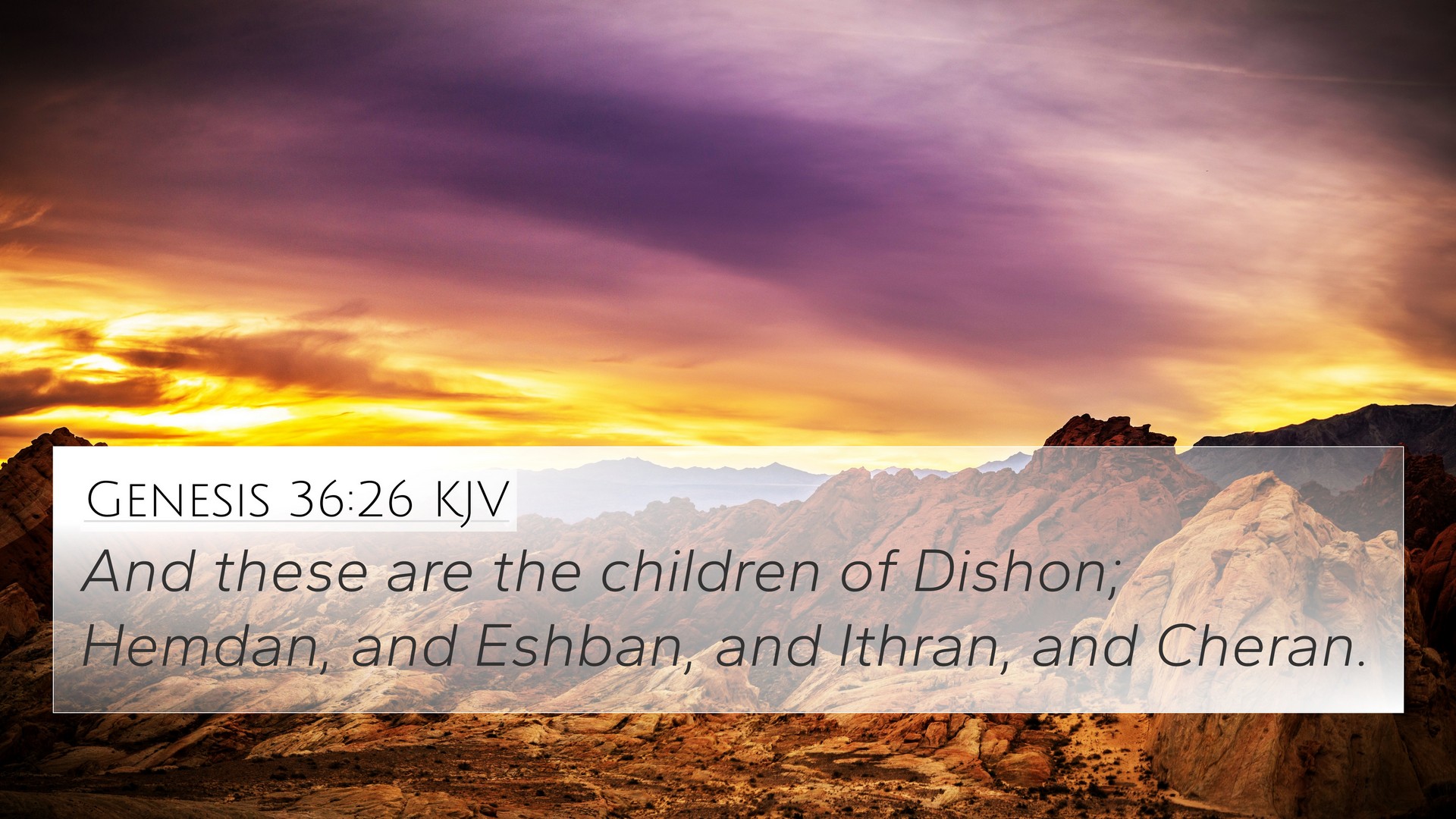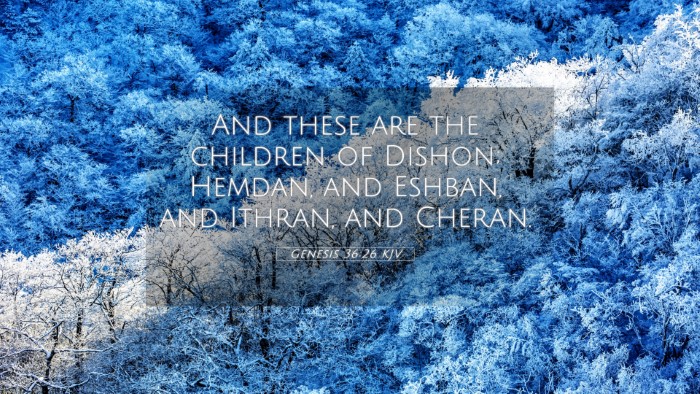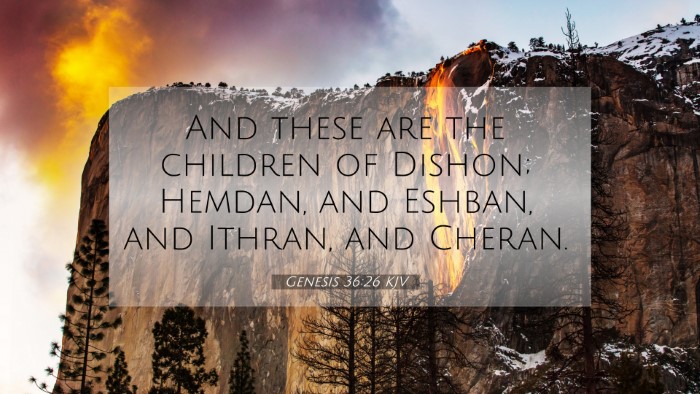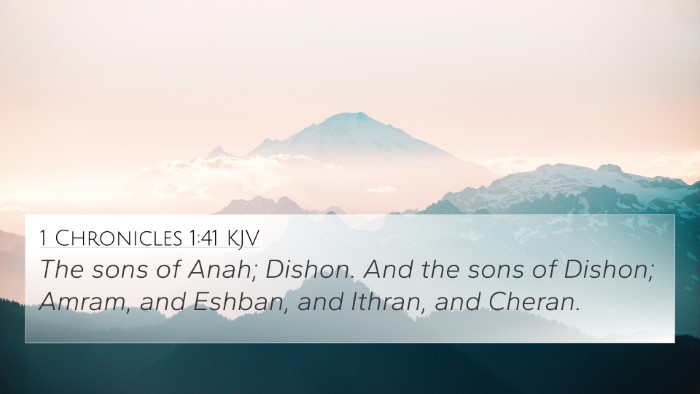Understanding Genesis 36:26
Genesis 36:26 reads: "These are the sons of Dishan: Uz and Aran." This verse is a brief mention of the descendants of the Edomite chief named Dishan, significant in the genealogical records that comprise the first book of the Bible.
Summary of Insights
The genealogies in Genesis serve not just a historical purpose but also reveal significant truths about the people of God and their interactions with one another. As we analyze the verse using insights from prominent Biblical commentaries, we can glean a deeper understanding and meaning.
Commentary Insights
-
Matthew Henry: Henry highlights the importance of genealogies in Scripture. He notes that they reflect God’s providence and plan through different generations and families. The mention of Uz and Aran under Dishan shows the specific lineage and its importance in the broader narrative of God's covenant people.
-
Albert Barnes: Barnes provides context by discussing the Edomites, descendants of Esau. He suggests that the names Uz and Aran, while seemingly obscure, have historical significance, possibly linking the descendants to specific geographical areas known in later texts. This connection to place indicates the establishment of tribes and habitation among the descendants.
-
Adam Clarke: Clarke goes further into the names themselves, suggesting that Uz may be associated with a region of significance, possibly connected to the land of Job. He posits that such genealogical records were important not only for lineage but also for understanding territorial claims among the people.
Theological Implications
This verse opens a dialogue about how even minor details in the genealogies can inform our understanding of God's unfolding story through families and communities. As we cross-reference this verse with related Scripture, we identify themes of lineage, identity, and covenant that run throughout the Bible.
Cross-Referencing Biblical Texts
In studying Genesis 36:26, we can link it with several other Bible passages that enhance our comprehension of its themes. Here are some relevant cross-references:
- Genesis 25:30-34 - The story of Esau and Jacob illustrates the family background connected to Edom.
- Genesis 36:1-2 - This initial passage introduces Esau as the father of Edom, adding clarity to the genealogical lineage.
- Numbers 20:14 - Illustrates the ongoing relationship and conflicts between Israel and Edom, descendants of Esau.
- Obadiah 1:10 - A prophecy concerning Edom, further establishing its significance in the biblical narrative.
- Job 1:1 - Uz is notable in the context of Job’s narrative, suggesting the importance of this name in historical and theological discussions.
- Jeremiah 49:10 - Edom’s future and judgment are discussed, reflecting its ongoing narrative within Scripture.
- Hebrews 12:16-17 - Refers back to the legacy of Esau, emphasizing the importance of familial choices and their consequences.
Thematic Connections Between Bible Verses
Understanding Genesis 36:26 involves recognizing its place within a larger framework of Biblical genealogies. This connects us to:
- Covenantal Themes: The lineage from Abraham to Isaac to Jacob impacts the unfolding story of salvation.
- Biblical Identity: Names and families illustrate how identity is formed in the context of covenant community.
- Historical Context: The families mentioned show the movement and establishment of tribes, reflecting God’s overarching plan.
Using Tools for Bible Cross-Referencing
To delve deeper into Scripture, one can utilize various tools such as:
- Bible Concordances: These can help identify specific themes and word connections.
- Cross-Reference Bible Study Guides: Helpful for finding linked scriptures efficiently.
- Bible Reference Resources: Comprehensive resources that assist in thematic studies
Conclusion
Genesis 36:26, while a succinct genealogy, holds profound significance in connecting biblical narratives and themes. Through careful examination and cross-referencing with other scriptures, we uncover a rich tapestry of God's relational approach with humanity and His unfolding saga through generations. Such study prepares us for deeper spiritual reflection and understanding of our own identity in Christ through the genealogical line linked to faith, family, and divine purpose.



